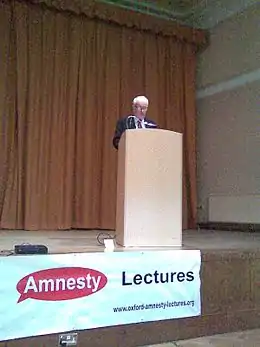Robin Blackburn
Robin Blackburn, né le , est un historien, ancien éditeur de la New Left Review et auteur de nombreux ouvrages sur le marxisme et l'histoire de l'esclavage dans le Nouveau Monde.
Robin Blackburn

| Naissance | |
|---|---|
| Nationalité | |
| Formation | |
| Activités |
| A travaillé pour | |
|---|---|
| Parti politique |
International Marxist Group (en) |
Il obtient en 1965 son baccalauréat en sciences en économie à l'université de Londres, puis enseigne la sociologie à la London School of Economics. Ancien membre de l'International Marxist Group, il est actuellement Distinguished Visiting Professor of Historical Studies à la New School de New York.
Ouvrages
En tant qu'auteur
- Prologue to the Cuban revolution (1963)
- avec Perry Anderson, Towards Socialism (1966)
- avec Alexander Cockburn, The Incompatibles: Trade Union Militancy and the Consensus (1967)
- The Overthrow of Colonial Slavery, 1776-1848 (1988)
- The Making of New World Slavery: From the Baroque to the Modern, 1492-1800 (1997)
- Abolition and Emancipation in Comparative Perspective (1992)
- Banking on Death: Or, Investing in Life — The History and Future of Pensions (2002)
- Age Shock and Pension Power: Grey Capital and the Challenge of the Aging Society (2007)
En tant qu'éditeur
- avec Alexander Cockburn, Student Power: Problems, Diagnosis, Action (1969)
- Ideology in Social Science: Readings in Critical Social Theory (1972)
- Explosion in a Subcontinent: India, Pakistan, Bangladesh, and Ceylon (1975)
- Revolution and Class Struggle: A Reader in Marxist Politics (1977)
- After the Fall: The Failure of Communism and the Future of Socialism (1991)
Liens externes
- Ressources relatives à la recherche :
- Ressource relative à la littérature :
- Notice dans un dictionnaire ou une encyclopédie généraliste :
- Présentation du Département de sociologie de l'université de l'Essex
- Page personnelle sur le site de l'université de l'Essex
- Profil sur le site de la New School
Cet article est issu de wikipedia. Text licence: CC BY-SA 4.0, Des conditions supplémentaires peuvent s’appliquer aux fichiers multimédias.